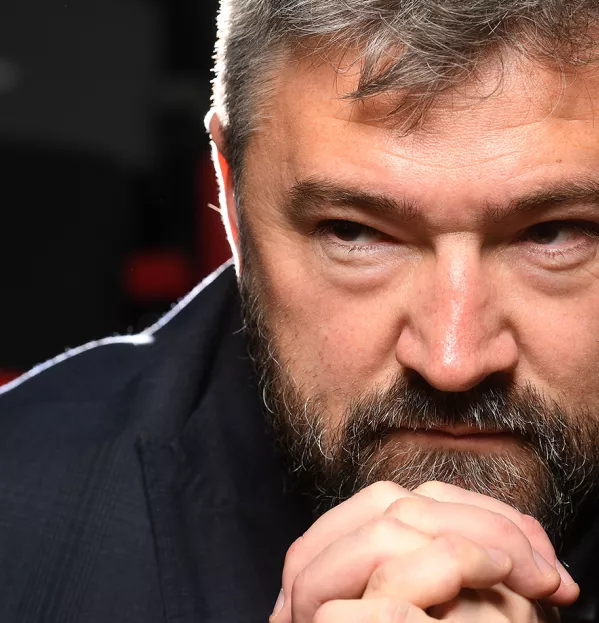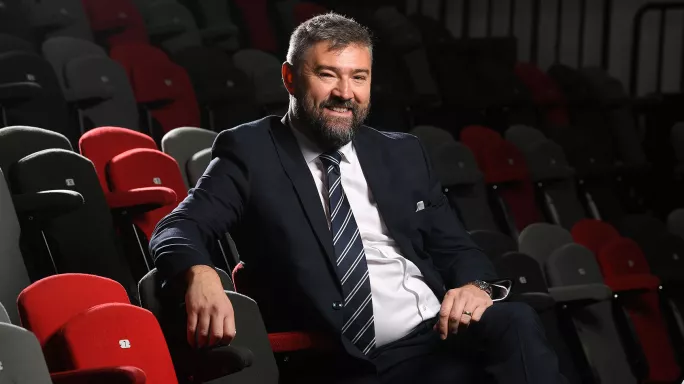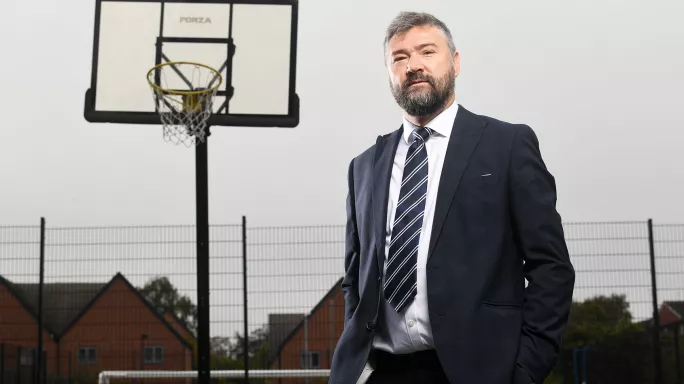
10 questions with...Tom Campbell

Tom Campbell is the CEO of E-ACT multi-academy trust, having taken up the post in January of this year.
The job represents Campbell’s first time leading a MAT, with him previously having held the post of chief education officer at Greenwood Academies Trust. E-ACT is made up of 28 primary and secondary schools spread across the country.
Answering Tes’ 10 questions, Campbell talks about his own time at school, including dressing up for a production of My Fair Lady; why schools need more external social support; and why he took time to be persuaded of the benefits of the MAT movement but is now a proud advocate for the system.
1. Who was your most memorable teacher?
My most memorable teacher was the headteacher of my primary school, Mr Shirlaw. He was a war veteran and a true “old school” teacher, including being a massive disciplinarian.
As a teacher he was unbelievable. He took us mountain climbing, taught us Scottish dancing and put on Gilbert and Sullivan productions. He was a real eccentric.
My mum has kept the photos of me aged 9 dressed up for a school play. We were doing My Fair Lady and I’m getting married, wearing a top hat.
I grew up on a council estate and having that kind of rich and varied cultural enrichment at school was incredible.
2. What did you most enjoy about school?
I enjoyed school and learning and being at school. I always felt that school was fun. The secondary school I went to was a tough school, it was called Denny High School and has been knocked down now.
I think my primary education prepared me for secondary school. I was 12 going on 40 because although I didn’t know what I wanted to do, I knew doing well at school would help me to have a better life.

From a young age I wanted to move away from where I grew up, and had a desire to have a better future than that of the adults I saw around me. I was motivated to do well and work hard, as I saw education as a passport to having a better life.
I ask myself this a lot at work: at what point do children start to realise that their position is different to others? When do they realise that they have less than others?
Yes, we want children to learn about the world, but not through the lens of what they don’t have.
3. Why did you choose to work in education?
Social mobility is a positive thing for society, and if you are one of those kids you always feel like an imposter. Now I’m an adult and there is no doubt I’m now definitely middle class, but inside I’m still from Denny.
This is a positive, though, as it allows me to connect with parents and kids in a different way. And this drew me to education as it meant I could help those in the same position.
4. What has been your proudest moment?
That would be my first headship. I was 30 and ambitious but I wasn’t prepared for the civic responsibility of leading in an area where there are a lot of social challenges. I felt the weight on my shoulders.
The school was in Leicester, and the advert described it as “the most challenging school in England”. When I was appointed, I threw myself into the role and I am still so proud that the school was judged “good” by Ofsted under my leadership.
More 10 questions...
- Melanie Renowden, CEO of the National Institute of Teaching
- Jonty Clark, CEO of The Beckmead Trust
- Stuart Gardner, CEO of Thinking Schools Academies Trust
We moved from being in the bottom 10 to the top 100 in the seven years I worked there, and what makes me even more proud is that even today it remains up there and continues to be a great school doing great things. That is what I am most proud of.
5. What do you regret?
Even when I’ve worked somewhere that I now consider to be a success, it wasn’t all plain sailing at the time.
There are probably many things that have happened that I regret that I’ve repressed for my mental health because if you spend too long thinking about them, it does you no good. Yes, I have regrets, but I try not to think about them.
I’m a let-it-go kind of guy, and instead I try to learn from my mistakes and improve.
6. What are the best parts of the English school system?
The best part of our school system is the multi-academy trust movement. And you might think, “Yeah, you would say that,” but actually I wasn’t always an advocate for it. In fact, I used to spend time trying to avoid joining a MAT.
However, with the benefit of hindsight, I can look back at local authority schools I worked in that were struggling and see now that joining a MAT would have helped us.

What I see now is the MAT structure facilitating the best things in education: collaboration, domain expertise and workforce reforms. We’ve seen a rapid evolution of workforce and collaboration because of the MAT structure.
There are roles that exist in MATs that didn’t exist before - it’s changed the route of progression and allows teachers to move up through different routes that aren’t the traditional head of department or head of year.
7. What are the worst parts of the education system?
I would say we’ve got two things: the need for exam reform and the increasing distance between schools and public services.
With exams, just look at the numbers: children are taking over 20 separate exam papers, totalling more than 30 hours of exams, and what exactly are we measuring in that context?
It feels like we’re putting kids through something no one really believes in. Employers have told us they don’t look at qualifications.
The truth is we don’t need to assess everything we teach. I loved learning a language but it doesn’t need to include an exam and a GCSE. What I want is to have a conversation with someone in French, I don’t need to understand the history of French art.
With regard to public services, schools have felt the cuts. It takes a village to educate a child and in the past we had lots of villagers helping us: children’s centres, social workers, investment from government, improving our buildings. Whereas now it’s quite lonely in education.
Today it feels like engagement with services seems to be risk management and litigation. Rather than “let’s improve the life chances of children”, it’s too much about “whose fault is this?”. Schools need partners now more than ever, and there is a real gap there.
8. What will schools look like 30 years in the future?
We should be moving to a more global standard of education. The number of British schools abroad is growing fast. It might not be British standards that become global. We should be thinking about a global workforce; universities are filled with a global population.
The logical solution is to determine a standard that spans every country. What should a 16-year-old need to know to work anywhere? Because in 30 years’ time, children need to be prepared to work anywhere.
9. Who have been your biggest influences in education?
The person who influenced me the most was the chair of governors I worked with in Leicester, Rick Moore. He appointed me and gave me the headship when I was just 30.
Rick was such a big character and incredibly smart and intelligent. He was a model communicator, showed me the importance of building relationships and didn’t force measures of accountability.
When we worked together he kept things “big picture” and was a real advocate for the community and the school itself. He showed me that you could bring yourself to work and be comfortable with who you were. No matter what company we were in, he was the same person.
In him, I really understood what integrity and authenticity meant, and I tried to model myself on the way he conducted himself.
10. What would you change if you were education secretary?
Rather than taking the post myself, what I’d really like to see is education depoliticised.
If we had a more cross-party collaboration then we wouldn’t have to see the various different party politics forced into our education policy.
The way our system works is that a child’s education can be overseen by numerous successive governments: a child starts under one party, and then before they’ve left primary, it may change again, and then in secondary it may change again. This is really unsettling and leaves a legacy of difficult issues.
We need a long-term plan, and that shouldn’t be the privilege of a political party.
Tom Campbell was talking to Grainne Hallahan
You need a Tes subscription to read this article
Subscribe now to read this article and get other subscriber-only content:
- Unlimited access to all Tes magazine content
- Exclusive subscriber-only stories
- Award-winning email newsletters
- Unlimited access to all Tes magazine content
- Exclusive subscriber-only stories
- Award-winning email newsletters
You need a subscription to read this article
Subscribe now to read this article and get other subscriber-only content, including:
- Unlimited access to all Tes magazine content
- Exclusive subscriber-only stories
- Award-winning email newsletters
- Unlimited access to all Tes magazine content
- Exclusive subscriber-only stories
- Award-winning email newsletters
topics in this article



